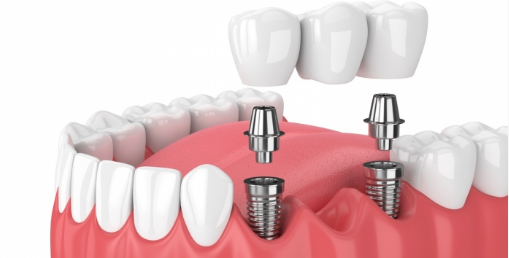Many factors affect the lifespan of dental implants, including:
Jaw bone quality
If your jaw bone is insufficient to form a stable foundation for the implant, or if you have an underlying condition affecting your jaw bone, the implant may fail.
Before considering a prosthetic implant, we will conduct a comprehensive examination of your jaw; this examination may include X-rays or 3D modeling. If your jaw bone is insufficient, you may need surgery to create more bone as a site for the implant.
Certain conditions, such as osteoporosis and peri-implant disease, can also cause jaw bone quality to decline over time. Osteoporosis makes bones more fragile and more susceptible to fracture under mechanical stress, while peri-implant disease causes inflammation of the gums around the implants.

Peri-implant disease
Peri-implant disease is the accumulation of plaque around the implant. In its early stages, plaque buildup is reversible, but if left untreated, it can lead to peri-implantitis.
Peri-implantitis is inflammation of the gums, which can lead to implant failure. Therefore, maintaining good oral hygiene after implant placement is crucial.
Teeth Grinding
Some people grind their teeth repeatedly while sleeping or under stress. The medical name for teeth grinding is bruxism.
This can cause implant screws to loosen or implants, screws, or crowns to break. This happens because the repetitive grinding motion causes microscopic movement of the implant, which can interfere with the bone integration process.
How experienced is your surgeon?
An inexperienced surgeon may not be able to perfectly design your implant or place it in the optimal position. They may decide to install a crown before the implant is fully stabilized, which risks damaging oral tissue.
Damage or Injury
Just like your natural teeth, ceramic crowns on implants can break or become damaged. Common causes of damage to ceramic crowns include:
Eating sticky or chewy foods
Chewing hard objects, such as hard candy or ice cubes
Opening bottles or packages with your teeth
Facial trauma or injury
The use of your implants (and your natural teeth) should be limited to eating and chewing. Using your teeth to open packages can significantly shorten the lifespan of your teeth, whether artificial or not.
A dentist or surgeon may be able to repair a damaged ceramic crown rather than replace it. This depends on whether the metal root is damaged and the extent of the damage to the crown.
If your jawbone is damaged by trauma, your dental implant may fall out like a normal tooth. If this happens, you may need to wait for your jawbone to heal before any implant restorations are performed.
Medical Conditions and Medications
Certain medical conditions can affect the longevity of dental implants. Cancer patients, especially those receiving radiation therapy and chemoradiotherapy, have a significantly increased risk of late implant failure.
Bone cancer patients receiving high-dose antiresorptive therapy (ART) are at high risk for complications after implant surgery, while osteoporosis patients receiving low-dose ART have a high implant survival rate.
Other medications that may reduce the success rate of dental implants include blood-thinning and immunosuppressive drugs.
People with diabetes are also at increased risk of dental implant failure. However, factors such as high blood pressure, coronary artery disease, gender, steroid therapy, chemotherapy, lung disease, and postmenopausal women not receiving hormone replacement therapy were not associated with an increased risk of implant failure.
Which teeth are replaced?
The type of tooth being replaced and its location in the mouth can affect the lifespan of dental implants. Teeth in the back of the mouth experience greater pressure from chewing food, so they may not last as long as teeth with less effective chewing abilities.
Age
People aged 60-79 are at a significantly higher risk of dental implant failure compared to those under 40. One factor may be that older people tend to heal more slowly than younger people.
How can I make my dental implants last longer?
There are several ways to maximize the lifespan of your new dental implants. Some factors, such as age, are beyond your control, but you can make choices to maximize the lifespan of your implants.
Avoid smoking and excessive drinking.
Smoking and excessive drinking can significantly affect the lifespan of dental implants. Smoking increases the risk of plaque buildup around implants, leading to peri-implantitis.
Smoking reduces oxygen in the blood, which slows healing throughout the body. This makes gums more susceptible to infection, and once infected, healing is more difficult. Quitting smoking before and after surgery can reduce the risk of surgical site infection.
Avoid consuming any alcoholic beverages for at least 72 hours after dental implant surgery. Alcohol thins the blood, so drinking alcohol too soon after surgery may hinder the formation of necessary blood clots in the gums.
Excessive alcohol consumption can also lead to dehydration, which can affect recovery at any stage of the postoperative healing process. If your gums are too dry, they may not heal as expected.
Brush and floss your teeth.
Dental implants require the same care as natural teeth. While the titanium root and ceramic crown of an implant are decay-resistant, the teeth and gums surrounding the implant are not.
Even after having an implant, you are still at risk for gum disease, which can lead to implant failure. Therefore, good oral hygiene is crucial for the long-lasting durability of your implants. It is also crucial to prevent damage to other teeth and the need for future implants.
Brushing and flossing twice a day will improve your gum health and minimize plaque buildup around the implant and other teeth.
See your dentist every 6 months.
If you have dental implants, regular dental visits are crucial. Your dentist will be able to identify any signs of gum disease and advise you on gum disease treatment if necessary, as well as the best ways to keep your dental implants healthy.